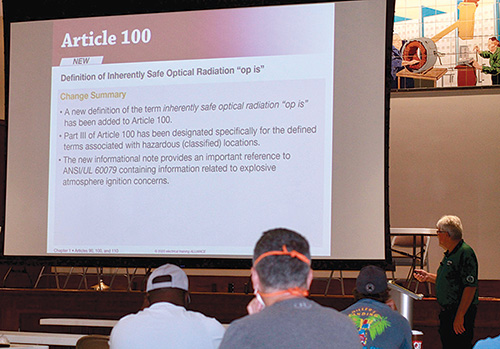
Every three years, revisions are made to the National Electrical Code (NEC) to improve safety in the rapidly changing electrical industry.
The National Fire Protection Association (NFPA) administers the updates to NFPA 70 NEC to reflect the newest safe installation practices utilized by the electrical industry, bringing about hundreds of revisions and new rules to the code.
On two consecutive Saturdays in July, the Electrical Connection IBEW/NECA partnership joined the IBEW/NECA Electrical Industry Training Center in sponsoring classes to detail the most significant changes in the latest edition of NFPA 70.
About 75 people attended the classes taught by Jeff Holmes, Dr. Linda Little and Bill Papin – all instructions at the Electrical Industry Training Center. Holmes and Little also serve on NEC panels that update the code.
NFPA 70 code requirements set the standard for safe work practices to protect personnel by reducing exposure to major electrical hazards. Originally developed at OSHA’s request, NFPA 70 helps companies and employees avoid workplace injuries and fatalities due to shock, electrocution, arc flash and arc blast.
RESIDENTIAL REVISIONS
Some of the major revisions to the code regarding residential electrical work include:
- Ground Fault Circuit Interrupters (GFCI) requirements have been expanded to include 125- to 250-volt circuits with no amp limit. This would include clothes dryers, ranges and all outlets for charging electric vehicles. In addition, all outside 150-volt or less outlets with 50 amps or less require GFCI protection. This would include outside air conditioning units and emergency generator connections.
- Whole house surge protectors required for all new homes. Whole house surge protectors are integrated with the circuit panel to stop electric surges from damaging appliances and electronics in the home. The new requirement reflects the need to protect internal circuit boards and electronics that are now common in stoves, ovens, refrigerators, furnaces, air conditioners, garage door openers, electric vehicle chargers, sprinkler systems and integrated smart home systems. Whole house surge protection will also be required for existing home electrical system upgrades. In addition to surges from the electrical grid, whole house surge protection also affords some protection from transient voltages which can be cause by lightning strikes.
- Outdoor power disconnects that are readily accessible and well-marked for first responders are required for all homes.
INDUSTRIAL, COMMERCIAL REVISIONS
Major revisions to the code regarding industrial and commercial electrical work include:
- New requirements, including restrictions, on using reconditioned equipment. The new requirements exempt equipment that undergoes routine maintenance. A prohibition on reconditioned equipment includes items such as GFCI equipment, arc fault protection, low voltage fuse holders, molded case circuit breakers, retro fit kits and more. Equipment that has been reconditioned must be clearly marked as such. That would include low- and medium-voltage and high-voltage power circuit breakers and electro-mechanical protective relays and current transformers.
- For service equipment, a barrier must be put in place to mitigate coming in contact with energized parts.
- Temporary wiring on construction sites no longer requires covers on boxes if the circuit is GFCI protected.
The NEC code changes must still be reviewed and adopted by local regulatory agencies.
ELECTRICAL CONNECTION
The Electrical Connection is a partnership of the International Brotherhood of Electrical Workers (IBEW) Local 1 and the St. Louis Chapter of the National Electrical Contractors Association (NECA).
It represents more than 5,000 highly skilled and safe IBEW electricians and the more than 150 NECA electrical contractors who employ them. For more than 75 years, the IBEW/NECA Electrical Connection partnership has trained more electricians/communication technicians than any education program in Missouri.
Its award-winning work provides safe and reliable electrical construction, maintenance, repair and replacement services across Missouri, the nation and the world. Learn more at electricalconnection.org.


